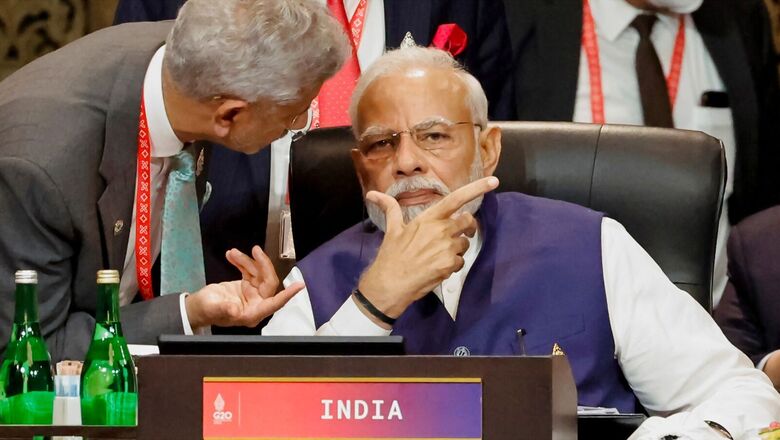
views
It will be a historic moment on 1 December 2022, when India will assume the G20 presidency for a year. The meetings will be held in every Indian state, and the leaders’ summit will be held in September next year in New Delhi. It will preside over 200 meetings to secure global economic health and prosperity. The G20 is a multilateral platform connecting the world’s major developed and emerging economies with over 80 percent of the world GDP, 75 percent of international trade, and 60 percent of the world’s population. Especially for India, it will be a significant opportunity to evolve and decouple its future challenges and work on its solution amicably. It will be interesting to see how India will prioritise its agenda globally.
India’s G20 presidency agenda on priorities are mainly counter-terrorist financing, anti-money laundering, drugs, reforms on the World Trade Organization (WTO), and the implementation of the Paris Climate Agreement. After the global pandemic of Covid-19, India also suffered with its GDP, and it will also be on the agenda. According to the World Bank, global growth will slow significantly from 5.5 percent in 2021 to 4.1 percent in 2022 and 3.2 percent in 2023. In the coming time, it will also aspire to become a $5-trillion economy and a truly digital democracy. India’s G20’s Sherpa, Amitabh Kant, also stated that India would look into finding out the major challenges of a debt crisis that will impact almost 70 countries and millions of people, its slowing global economy, and the existence of a climate crisis.
India is the world’s largest democracy and has come a long way in the last few decades. We stand in the third largest economy in the world (in purchasing power parity terms). Numerous other future challenges for India need to be tackled quickly.
Terror Financing
Prime Minister Narendra Modi has strongly urged the avoidance of ambiguity in dealing with terrorism and warned against nations that employ terrorism as a foreign policy instrument. Mr. Modi made these remarks at the third No Money for Terror Ministerial Conference on Counter-Terrorism Financing. He discussed the erroneous conceptions of terrorism and stated that the intensity of the response to different attacks could not vary depending on where they occur. The Prime Minister added that all acts of terrorism merit outrage and action. He emphasised that countries that support terrorism must pay the price for doing so, which is again to be a major challenge for India.
Health Challenge
At the G20 Summit of Indonesia, the countries were asked to build a global health architecture that would help with many health issues and help developing economies protect themselves better from health crises like Covid-19 and monkeypox. India also faces similar challenges from time to time and needs to form a bloc to introduce pandemic prevention and boost the countries to fight against it. The fund will significantly benefit developing economies that lack the necessary equipment and talent.
Climate Change
Climate change will continue to be one of the most critical problems. India is one of the most vulnerable countries, and the costs of climate change, whether from pollution or extreme weather events happening more often, have risen quickly. A lot of work, resources, and planning will be needed to reach the net-zero carbon emissions economy goal by 2070. Public investments in green infrastructure will need to keep up with the progress made with renewable energy generation capacities. Because other countries are making similar changes simultaneously, the uncertainty about technologies, costs, and the availability of raw materials is likely to worsen.
Digital Economy
The G20 countries agreed that the digital economy could help the economy return after the pandemic. As the percentage of digitalisation in each country’s GDP goes up, it’s crucial to track the growth of the digital economy by diagnosing, evaluating, and keeping an eye on how policies are working. Since the DETF was created in 2016, measuring the digital economy has been a top priority for the G20. India’s finance minister said that the G20 members’ approval of the proposed new global tax framework would help deal with problems caused by the digitalisation of the economy. Still, there was no sign of an agreement to eliminate the equalisation Levy, the tax on digital services.
Vinay Kwatra, secretary of state for foreign affairs, stated that these issues would be the primary focus of the meetings. The G20 nations are also confronted with multiple problems that require a global solution. PM Modi, addressing the Indian audience in Bali, stated that India maintains close ties with developed nations on the one hand and a deep understanding of developing countries on the other. He also emphasised India’s stance that only one world should exist without a first or third world. All of these positive connotations point to the true spirit of Vasudhaiva Kutumbakam (the world is one family), which will seek pragmatic global solutions for the welfare of all and evolve India through this leadership.
Neeraj Singh Manhas is the Director of Research in the Indo-Pacific Consortium at Raisina House, New Delhi. The views expressed in this article are those of the author and do not represent the stand of this publication.
Read all the Latest Opinions here

















Comments
0 comment